Kidney for sale: How organs can be bought via social media in the Philippines
In the second of a two part series looking at the illegal trade in human organs in the Philippines, CNA's Pichayada Promchertchoo investigated how social media is an essential tool for many of those involved in the lucrative business.
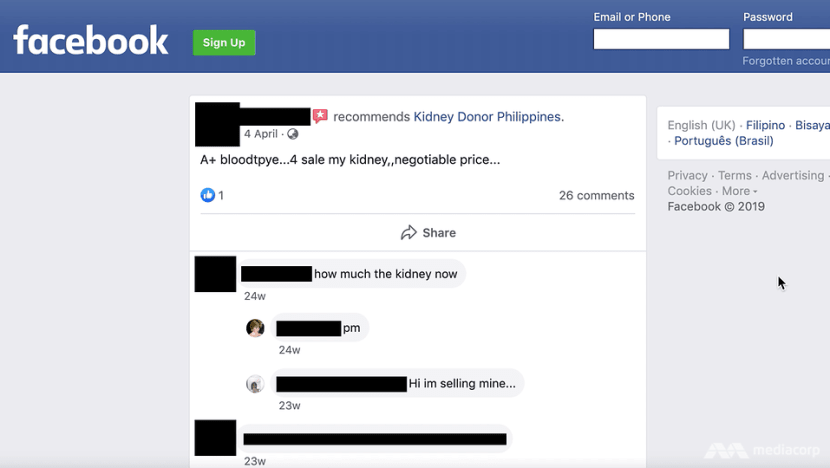
One of conversation threads on Facebook shows several users have used the social media platform to advertise their kidneys for sale
MANILA: Carlos welcomed his newborn baby girl with so much love, and trepidation.
Their midwife had cancelled the delivery at home. So his wife was lying in a hospital bed after an unplanned visit the family could not afford. He had no idea where he could find 14,000 Philippine pesos (US$270) for the hospital bill and his family had not been able to leave the ward, even though they desperately wanted to.
Then a possible solution dawned on Carlos. Years of living in one of Manila’s poorest communities had taught him where to find money in a time of desperation. He logged on to Facebook on Sep 27, 2019, and posted a short message. He hoped it would bring him cash in no time:
I am selling one of my kidneys, contact me. I am serious... No fake transaction please…
Carlos was one of 14 Facebook users on that particular thread who advertised their kidneys for sale. They shared their contact numbers, blood type and their urgent need for money. The thread started on Jul 26 this year and continued to attract organ traders. It is one of many found on the platform.
“When the doctor asked when I’d be able to bring my family home, I felt extremely pressured because I didn’t have the money to get them out. I told him I’d find a way and do what I could to get it,” said Carlos inside his small house in Central Luzon. His baby girl was sleeping soundly in a wooden basket near her frail mother.
“I topped up my phone and made a search on Facebook. I typed ‘kidney for sale’ in the search bar and so many options appeared. Some are looking for donors. Others are offering to buy organs.”
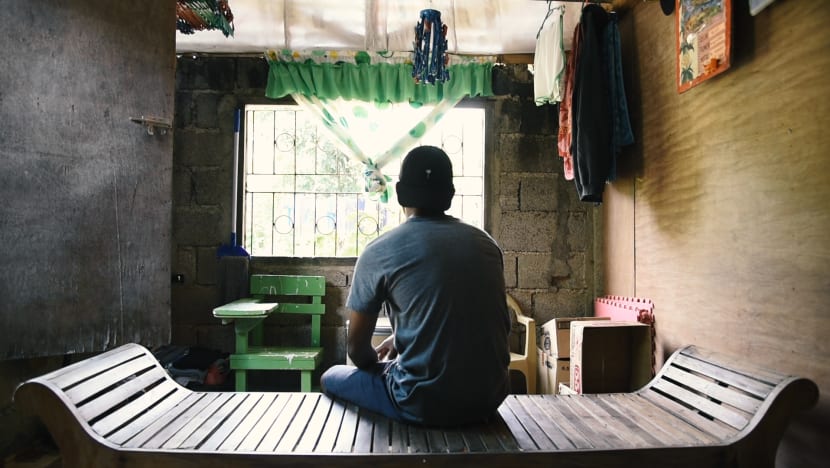
In the Philippines, advertisements for healthy kidneys are common on social media. Typing something along the lines of ‘kidney donation Philippines’ or ‘kidney for sale’ in the Facebook search bar will reveal countless posts by organ brokers, kidney patients and hopeful sellers who want to leverage social media’s reach to complete a deal.
Organ trafficking is nothing new in the Southeast Asian nation. For decades, it has been known globally as a high-risk country for transplant tourism because of its great medical expertise, several transplant facilities and limited national oversight.
What is new is its expansion into the world of social media. But given its clandestine nature, law enforcement officers struggle to keep up with traffickers who carry out the trade behind the anonymity of the Internet.
“It has been observed that all forms of trafficking in persons, whether for sex or labour trafficking, are now being committed through the use of online platforms like social media,” said Yvette T Coronel, deputy executive of the Philippines’ Inter-Agency Council Against Trafficking under the Department of Justice.
“(The) kidney is the most commonly trafficked organ due to its high demand in the black market and the fact that a donor can survive with only one kidney.”
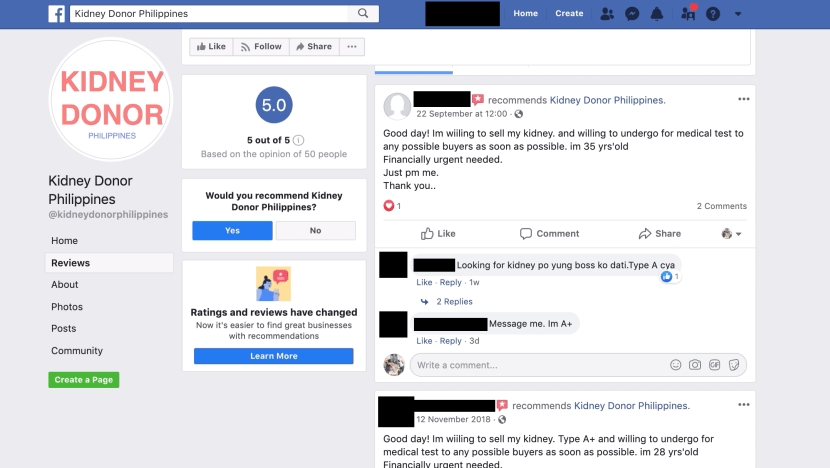
Human trafficking for organs is a serious crime punishable by up to 20 years in prison under Philippine law. But when pushed into despair, the likes of Carlos tend to cave in to a pressing need for money and, in his case, the well-being of their loved ones.
The tricycle driver said he was scared by the idea of selling one of his kidneys but felt he had no other option. He planned to spend the money on the hospital bills, a tricycle of his own and a small business.
“If we can do that, we’ll probably have a chance to improve our lives and move away from our current living conditions,” he said.
‘I’M SELLING MY KIDNEY’
As in many other countries, Facebook is a prevalent social media platform in the Philippines with more than 66 million users. Its popularity has attracted some criminals who want to use it for gain.
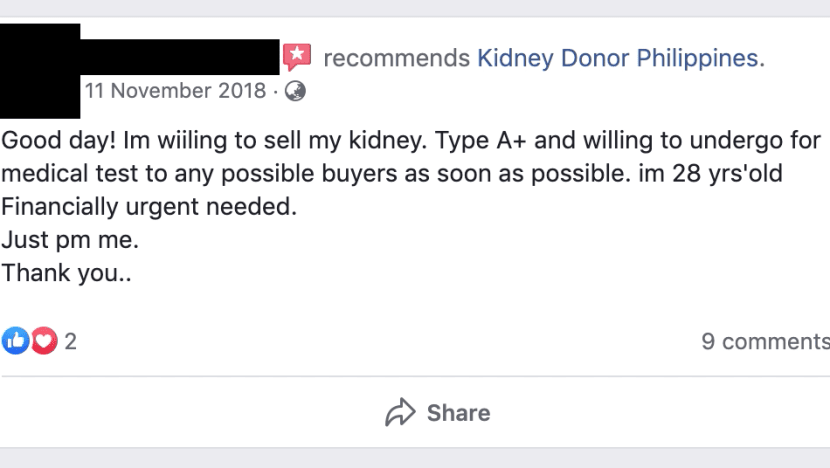
In a written statement to CNA, a Facebook spokesperson said there are clear rules that prohibit the buying or selling of regulated goods on the platform, including human organs.
“We remove this content whenever we become aware of it, and we encourage our community to report content that they think might break these rules,” the spokesperson said.
CNA found multiple examples of such posts that contravene Facebook’s rules. However, the platform quickly took action to remove the posts once notified. Facebook also said its law enforcement team works closely with the Philippines’ law enforcement agents to assist them in responding to critical situations.
“We recognize that there are benign and important reasons for people to discuss organ donation on Facebook, for example, encouraging people to become donors, or raising money for an organ transplant, and we allow people to do so in these contexts.”
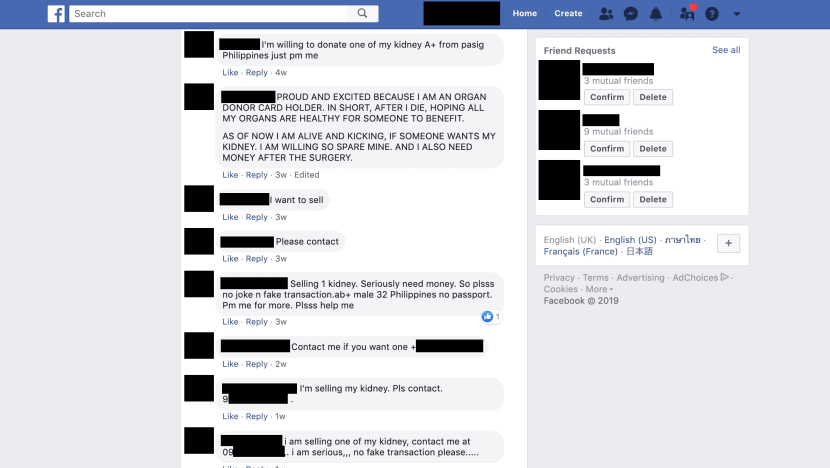
Still, universal regulation of social media networks has proven problematic. On Facebook, for instance, a number of users in the Philippines have put up posts offering to sell their kidneys openly, and with numerous details - from phone numbers to the results of various health tests, and how they have a healthy lifestyle free from cigarettes and alcohol.
According to Victor Lorenzo, chief of the Cybercrime Division at the Philippines’ National Bureau of Investigation, the illicit trade of human organs remains a thriving and lucrative business in the country. With the Internet, he said, criminals can negotiate in the comfort of their home and remain anonymous.
Still, online communications have their pros and cons.
“If you go online, you could also be monitored online,” Lorenzo told CNA.
Organ sale is illegal. When you engage in this, you must have a facility to communicate with donors, the buyers and those financiers. So they have to communicate. In order to get donors, they have to advertise publicly and openly. They can’t go into the dark web because many people can’t access it. And that’s our advantage
Cybercrime police in the Philippines regularly scan the Internet for suspicious activities. When they pick up a lead on possible organ trafficking, they forward the information to relevant authorities for follow-up operations. Sometimes, Lorenzo added, pieces of information are combined to map a geographical pattern that could narrow down areas in question.
“Behind an online transaction is an actual person,” said the cybercrime agent. “Even though they’re anonymous, at least you have a certain lead on those people behind this transaction, and that’d be enough for us to follow through in an investigation.”
ORGAN SALE: A TICKET TO SURVIVAL
Still, law enforcement officers may not be able to eradicate the organ black market alone. So anti-human trafficking efforts are also being made at the hospitals licensed to perform transplantation. Overseeing these facilities in the Philippines is the National Transplant Ethics Committee, whose main role is to ensure every organ donation is legitimate and free from commercial gains.
“When you say ‘organ donation’, it’s expected to be nonmonetary. It should be purely voluntary, truly altruistic, and free from undue enticement,” said Dr Francisco Sarmiento from the Philippine Organ Donation and Transplantation programme under the Department of Health.
Financial neutrality is required for organ donors and recipients in the Philippine, according to Dr Sarmiento. It means both parties should neither gain or lose financially due to the act of donation.
So any change would more or less lead to that slippery slope towards organ trafficking,” he added. “For living non-related organ donation, this is where the complication sets in.
Through interviews with potential donors and recipients, Transplant Ethics Committees have to determine the willingness of each organ donation and ascertain the intent is not a result of coercion, deception or exploitation. However, there have been reports that certain medical professionals mastermind the illegal transaction and transplant surgery of human organs themselves.
“They call it an ‘all-in package’, meaning they’ll recruit the donor and make arrangements for the operation. Payment will be made through them and they’ll be the one who distributes it to the team,” Dr Sarmiento said.
“We have reports but they still need to be verified. Our law enforcers are informed of this and it’ll be on their part to do the necessary surveillance."
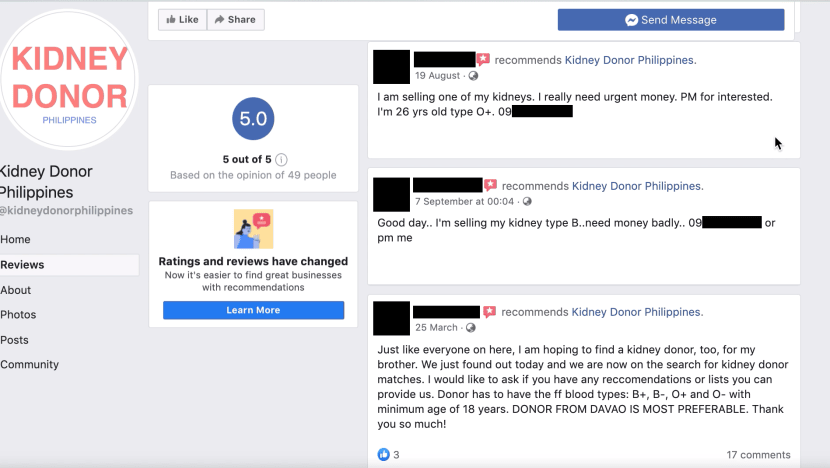
With the trade expanding online, there are calls for social media companies to do more to curb the illicit proliferation. According to Dr Sarmiento, popular platforms like Facebook and Instagram, which he said are “vehicles for advertisement”, should be engaged in the nationwide human trafficking eradication efforts.
“We also receive social media postings on our own page inquiring about organ sale. That’s why the engagement with the concerned agencies is very important so they could empower themselves or make the legal environment more responsive,” he added.
Back in Central Luzon, Carlos dreams of a brighter future with his family. He managed to borrow some money to pay for the hospital bill and no longer needs to sell his kidney. But that may change if his family ever needs money again in the future, he admits.
“My family are the most important people in my life,” he said. “It’ll always be an option.”
NOTE: Carlos’ real name has been changed to protect his identity.
This the second part of a series looking at the illegal trade in human organs in the Philippines. The first part can be found here.














